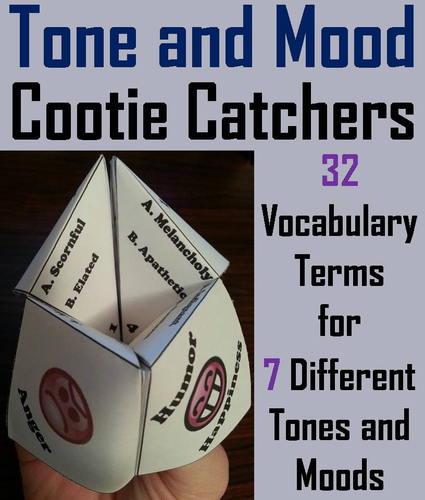




This activity has students reading a vocabulary word and then giving its definition.
Tones and Moods:
Fear/ Sadness
Logical/ Neutral
Humor/ Happiness
Anger/ Tranquility
Fantasy/ Romance
Arrogance/ Sarcasm
Vocab:
Apathetic, Candid, Ecstatic, Elated, Erudite, Facetious, Foreboding, Forthright, Incredulous, Indignant, Jubilant, Malicious, Melancholy, Morose, Scornful, Somber, Affectionate, Amorous, Caustic, Content, Exuberant, Fanciful, Flippant, Haughty, Insolent, Jovial, Meditative, Nostalgic, Serene, Soothing, Spiritual, Whimsical
***** Enjoy this Lesson? Do a search for my other Cootie Catchers: *****
♦ Reading Strategies:
Authors Purpose
Cause and Effect
Character Traits
Compare and Contrast with Pictures
Compare and Contrast
Creative and Critical Thinking
Drawing Conclusions
Fact or Opinion
Figurative Language
Fluency
Generalizations
Genre Identification
Genre Types
Idioms
Inference
Literary Devices
Main Idea
Metaphors
Nonfiction Text Features
Paraphrasing
Parts of a Book
Personification
Point of View
Predictions
Reading Comprehension
Reading Response Questions
Restating the Question
Sequencing
Setting
Similes
Story Elements
Summarizing
Text Structures
Text Structures: Informational Text Structures
Theme
Writing Prompts
♦ Vocabulary:
Analogies (Grades 3-5)
Analogies (Grades 6-8)
Analogies (Grade 9)
Antonyms
Compound Words
Context Clues
Greek and Latin Roots
Homophones
Homonyms
Multiple Meaning Words
Prefixes
Root Words
Shades of Meaning
Spelling
Suffixes
Synonyms
Tone and Mood
Transition Words
♦ Grammar:
Adjective Identification
Adjectives: Comparative and Superlative
Adverbs
Appositives
Apostrophes
Capitalization
Clauses
Commas
Conjunctions
Contractions
Mentor Sentences
Nouns: Common, Proper, and Plural
Nouns: Collective
Nouns: Common and Proper
Nouns: Irregular Plural
Nouns: Plural Nouns
Nouns: Possessive Nouns
Parts of Speech
Prepositions
Prepositional Phrases
Pronouns: Identification
Pronouns: Possessive
Pronoun Antecedent Agreement
Quotation Marks
Sentence Types
Sentences: Fragments and Run-Ons
Sentences: Simple, Compound, and Complex
Subject and Predicate: Complete and Compound
Verb Identification
Verb Tenses
Verbs: Helping
Verbs: Irregular
Verbs: Subject Verb Agreement
Tones and Moods:
Fear/ Sadness
Logical/ Neutral
Humor/ Happiness
Anger/ Tranquility
Fantasy/ Romance
Arrogance/ Sarcasm
Vocab:
Apathetic, Candid, Ecstatic, Elated, Erudite, Facetious, Foreboding, Forthright, Incredulous, Indignant, Jubilant, Malicious, Melancholy, Morose, Scornful, Somber, Affectionate, Amorous, Caustic, Content, Exuberant, Fanciful, Flippant, Haughty, Insolent, Jovial, Meditative, Nostalgic, Serene, Soothing, Spiritual, Whimsical
***** Enjoy this Lesson? Do a search for my other Cootie Catchers: *****
♦ Reading Strategies:
Authors Purpose
Cause and Effect
Character Traits
Compare and Contrast with Pictures
Compare and Contrast
Creative and Critical Thinking
Drawing Conclusions
Fact or Opinion
Figurative Language
Fluency
Generalizations
Genre Identification
Genre Types
Idioms
Inference
Literary Devices
Main Idea
Metaphors
Nonfiction Text Features
Paraphrasing
Parts of a Book
Personification
Point of View
Predictions
Reading Comprehension
Reading Response Questions
Restating the Question
Sequencing
Setting
Similes
Story Elements
Summarizing
Text Structures
Text Structures: Informational Text Structures
Theme
Writing Prompts
♦ Vocabulary:
Analogies (Grades 3-5)
Analogies (Grades 6-8)
Analogies (Grade 9)
Antonyms
Compound Words
Context Clues
Greek and Latin Roots
Homophones
Homonyms
Multiple Meaning Words
Prefixes
Root Words
Shades of Meaning
Spelling
Suffixes
Synonyms
Tone and Mood
Transition Words
♦ Grammar:
Adjective Identification
Adjectives: Comparative and Superlative
Adverbs
Appositives
Apostrophes
Capitalization
Clauses
Commas
Conjunctions
Contractions
Mentor Sentences
Nouns: Common, Proper, and Plural
Nouns: Collective
Nouns: Common and Proper
Nouns: Irregular Plural
Nouns: Plural Nouns
Nouns: Possessive Nouns
Parts of Speech
Prepositions
Prepositional Phrases
Pronouns: Identification
Pronouns: Possessive
Pronoun Antecedent Agreement
Quotation Marks
Sentence Types
Sentences: Fragments and Run-Ons
Sentences: Simple, Compound, and Complex
Subject and Predicate: Complete and Compound
Verb Identification
Verb Tenses
Verbs: Helping
Verbs: Irregular
Verbs: Subject Verb Agreement
Something went wrong, please try again later.
This resource hasn't been reviewed yet
To ensure quality for our reviews, only customers who have purchased this resource can review it
Report this resourceto let us know if it violates our terms and conditions.
Our customer service team will review your report and will be in touch.
$3.00
